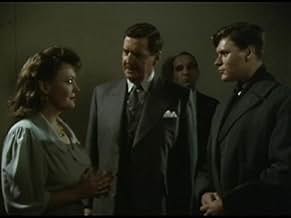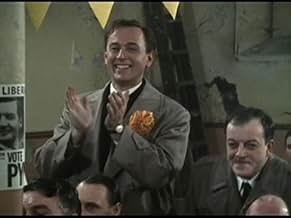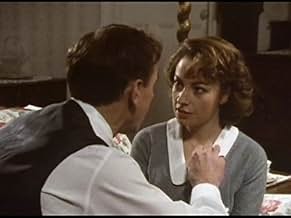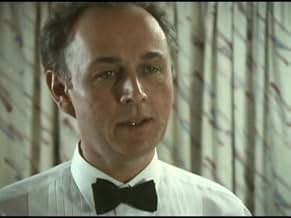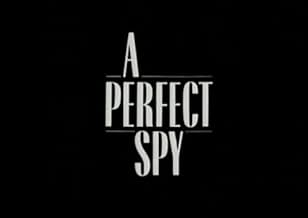A Perfect Spy
- TV Mini Series
- 1987
- 6h 14m
IMDb RATING
7.3/10
1.1K
YOUR RATING
The rise and fall of Magnus Pym and his career through intelligence. From chance meetings with people will be important to him in the future to a life in Czechoslovakia, Pym weaves his way t... Read allThe rise and fall of Magnus Pym and his career through intelligence. From chance meetings with people will be important to him in the future to a life in Czechoslovakia, Pym weaves his way through the complicated world of espionage.The rise and fall of Magnus Pym and his career through intelligence. From chance meetings with people will be important to him in the future to a life in Czechoslovakia, Pym weaves his way through the complicated world of espionage.
- Nominated for 2 Primetime Emmys
- 1 win & 6 nominations total
Browse episodes
Featured reviews
This is my second time through for A Perfect Spy. I watched it 2 or 3 years ago and liked it. I like it still. It's natural that it gets compared to the beeb's other big Le Carre' series, Tinker Tailor Soldier Spy. Tinker Tailor focuses on the "game" spies play; Perfect Spy gives us the other axis - what kind of person a spy is. There are a number of themes that these movies share, along with others in the genre.
Ambiguity - moral, sexual, interpersonal - which creates a multidimensional space of true vs. false, inside vs. outside, love vs. responsibility. In a way, these characters are happiest when they are being treated the most shabbily by those they love and respect - "backstabbed" in its various nuances.
The theme of fathers and father-figures is also important. One of the most intriguing characters in A Perfect Spy is Rick, the main character Magnus' perhaps ersatz father. Throughout the story he betrays and is betrayed. A rogue who always manages to climb back up the ladder when he's been toppled, who seems impervious to what others think of him, asks Magnus each time they meet, "Do you love your old man?" and never, "Do you love me?" Maybe it says this somewhere else, but A Perfect Spy is a love story.
Another theme is that of malignancy. The nature of the business is to turn others - turn them against their government, against their friends and associates, turn them against their values and beliefs. In each of the Le Carre' movies I have seen, The Spy who Came in From the Cold, Looking Glass War, Tinker Tailor Soldier Spy, Smiley's People, and A Perfect Spy, turning and being turned is the foundation of the tragedy.
Finally, not so much a theme as an artistic touch - in each of these films there is usually only a single gun shot, or perhaps two shots bookending the story. Violence, torture, cruelty are always just beneath the surface. We see their results not as streams of blood or dank prison cells but in the the objects Le Carre''s characters cling to as they are ineluctably sucked down into the morass.
If you haven't seen the films above, and you enjoy A Perfect Spy, you are in for a treat. I'd also recommend The Sandbagger series (Yorkshire TV), the 2nd and 3rd seasons of which begin to reach the level of this kind of complexity. The IPCRESS File and Burial in Berlin are nice, though light weight. For political intrigue try A Very British Coup, House of Cards and Yes, Minister/Yes, Prime Minister.
If only a brit would set his hand to making The Three Kingdoms - there would be a film with intrigue and complexity.
Ambiguity - moral, sexual, interpersonal - which creates a multidimensional space of true vs. false, inside vs. outside, love vs. responsibility. In a way, these characters are happiest when they are being treated the most shabbily by those they love and respect - "backstabbed" in its various nuances.
The theme of fathers and father-figures is also important. One of the most intriguing characters in A Perfect Spy is Rick, the main character Magnus' perhaps ersatz father. Throughout the story he betrays and is betrayed. A rogue who always manages to climb back up the ladder when he's been toppled, who seems impervious to what others think of him, asks Magnus each time they meet, "Do you love your old man?" and never, "Do you love me?" Maybe it says this somewhere else, but A Perfect Spy is a love story.
Another theme is that of malignancy. The nature of the business is to turn others - turn them against their government, against their friends and associates, turn them against their values and beliefs. In each of the Le Carre' movies I have seen, The Spy who Came in From the Cold, Looking Glass War, Tinker Tailor Soldier Spy, Smiley's People, and A Perfect Spy, turning and being turned is the foundation of the tragedy.
Finally, not so much a theme as an artistic touch - in each of these films there is usually only a single gun shot, or perhaps two shots bookending the story. Violence, torture, cruelty are always just beneath the surface. We see their results not as streams of blood or dank prison cells but in the the objects Le Carre''s characters cling to as they are ineluctably sucked down into the morass.
If you haven't seen the films above, and you enjoy A Perfect Spy, you are in for a treat. I'd also recommend The Sandbagger series (Yorkshire TV), the 2nd and 3rd seasons of which begin to reach the level of this kind of complexity. The IPCRESS File and Burial in Berlin are nice, though light weight. For political intrigue try A Very British Coup, House of Cards and Yes, Minister/Yes, Prime Minister.
If only a brit would set his hand to making The Three Kingdoms - there would be a film with intrigue and complexity.
It's been a long time since I saw this mini-series and I am happy to say its remembered merits have withstood the test of time.
Most of the components of 'A Perfect Spy', the adaptation of LeCarré's finest novel, in my opinion, are top-drawer. Outstanding aspects of it are the musical score and the masterful screenplay, the latter written by Arthur Hopcraft who was also, I believe, the screenwriter for 'Tinker Tailor Soldier Spy' with Alec Guinness a few years before.
The actors are mostly very good, some superb, like Alan Howard's Jack Brotherhood and Ray McAnally's Ricky Pym. Peter Egan is fascinating to watch because his face changes with every camera angle. The passage of time and the effects upon the physical appearances of the characters is very believably done. So much so that I wondered exactly how old Peter Egan was at the time of filming. The only jolt comes after the character of Magnus Pym is transferred from the very able hands of a young actor named Benedict Taylor to those of a noticeably too-old Peter Egan, just fresh out of Oxford. But this is a minor and unimportant seam in the whole.
Egan has trouble being convincing only when the text becomes melodramatic and he needs to be "upset" emotionally, ie cry. None of the actors have a very easy time with these moments, aside from the wonderful Frances Tomelty who plays Peggy Wentworth for all she's worth and steals the episode with ease.
Jane Booker is annoying as Mary Pym. She has part of the character under her skin but often displays an amateurish petulance that diminishes her as a tough cookie diplomatic housewife, which Mary Pym is. Rüdiger Weigang is splendid as Axel, amusing, ironic and brilliant. I also enjoyed Sarah Badel's camp turn as the Baroness.
The British view of Americans is vividly rendered in some dryly hilarious scenes. When the Yanks have come abroad to confab with Bo Brammell (head of MI6) the American contingent are portrayed as empty-headed buffoons who appear to have memorized a lot of long words out of the Dictionary and spiced them liberally with American jargon and psycho babble, much to the bemused scorn of the English.
The humor and sadness are subtly blended. LeCarré has a knack for mixing disparate elements in his stories and Hopcraft has brilliantly captured the melancholy, yet wistful, atmosphere of the original.
Not a perfect production (what is?) and yet the best of the LeCarré adaptations to reach film or television to date.
Highly recommended to all spy-thriller lovers and especially LeCarré fans. DVD available from Acorn.
Most of the components of 'A Perfect Spy', the adaptation of LeCarré's finest novel, in my opinion, are top-drawer. Outstanding aspects of it are the musical score and the masterful screenplay, the latter written by Arthur Hopcraft who was also, I believe, the screenwriter for 'Tinker Tailor Soldier Spy' with Alec Guinness a few years before.
The actors are mostly very good, some superb, like Alan Howard's Jack Brotherhood and Ray McAnally's Ricky Pym. Peter Egan is fascinating to watch because his face changes with every camera angle. The passage of time and the effects upon the physical appearances of the characters is very believably done. So much so that I wondered exactly how old Peter Egan was at the time of filming. The only jolt comes after the character of Magnus Pym is transferred from the very able hands of a young actor named Benedict Taylor to those of a noticeably too-old Peter Egan, just fresh out of Oxford. But this is a minor and unimportant seam in the whole.
Egan has trouble being convincing only when the text becomes melodramatic and he needs to be "upset" emotionally, ie cry. None of the actors have a very easy time with these moments, aside from the wonderful Frances Tomelty who plays Peggy Wentworth for all she's worth and steals the episode with ease.
Jane Booker is annoying as Mary Pym. She has part of the character under her skin but often displays an amateurish petulance that diminishes her as a tough cookie diplomatic housewife, which Mary Pym is. Rüdiger Weigang is splendid as Axel, amusing, ironic and brilliant. I also enjoyed Sarah Badel's camp turn as the Baroness.
The British view of Americans is vividly rendered in some dryly hilarious scenes. When the Yanks have come abroad to confab with Bo Brammell (head of MI6) the American contingent are portrayed as empty-headed buffoons who appear to have memorized a lot of long words out of the Dictionary and spiced them liberally with American jargon and psycho babble, much to the bemused scorn of the English.
The humor and sadness are subtly blended. LeCarré has a knack for mixing disparate elements in his stories and Hopcraft has brilliantly captured the melancholy, yet wistful, atmosphere of the original.
Not a perfect production (what is?) and yet the best of the LeCarré adaptations to reach film or television to date.
Highly recommended to all spy-thriller lovers and especially LeCarré fans. DVD available from Acorn.
This is without doubt my favourite Le Carre novel and it is transformed to the silver screen with all the love and care one could wish for. I read a review on this site that seems to find the characters loathsome but I believe this misses the point. All Le Carre stories are essentially love stories and this is no exception. It is an accurate reflection of the period in which it is set. Betrayal is the key by everybody for the good of nobody. Pym upbringing is so close to my own that I find it chilling watching. Peter Egan is in his finest role and the late lamented Ray McAnally is unbelievably good. Even the smallest roles played by such as Andy de la Tour, Tim Healy and Jack Ellis are spot on. This cast is a Theatre Impresario's Dream. The Story should not be spoiled by ill informed description but suffice it to say it relates to a young mans slow but inexorable destruction and descent into espionage and treason. All my sympathies lie with Magnus Pym and his sole (non sexual) love for Poppy (Rüdiger Weigang-as wonderful as always. His only true friendship but also by definition another in the long line of betrayals. OUTSTANDING! Rent it, buy it. love it.
If Smiley's People and Tinker Tailor Spy were about the "how" of espionage, A Perfect Spy is about the "who".
Whereas the first two were essentially two long investigations, A Perfect Spy, which begins as a non-linear story line in the novel, is about the socio-psychological components of what goes into making a spy.
While those who have read the book will find this adaptation surprising, it is also one of the finest. The story is linear, starting with a young Magnus, his con father, and his acolytes.
The background of the series is about the issue of what I would call inverted loyalties. Time and again, we see Magnus' relationship with his father as one where the former is criminally tolerant and indulgent, as any son with a deranged father might. During Magnus' childhood, and through his mentoring by Jack Brotherhood, we see an individual with divided loyalties, but seemingly true to both.
What this creates for the viewer is the impression that the good guys are actually bad, and vice versa, without resorting to any literary or artistic device. For example, we see immediately that Axel is initially harmless, but while he does something objectionable, nevertheless remains very attaching. For Magnus, it is the same. The buildup of his character during childhood only strengthens our sympathy for him. The reality is only revealed when Egan's character towards the end, when the Americans are catching on) starts to decompose.
To my taste, the series spends too much time on the childhood of the hero character. There are also devices taken from the book that are clearly unnecessary for the series (the green filing cabinet for example), and the relationship with Brotherhood could have been expanded, for the sake of balance with that of Axel Hampel.
Not to be sexist, but the women in the series are simply annoying. Also, their role in Magnus', Jack's professional lives and the spy craft is merely as sex-pots, which doesn't always conform to the zeitgeist. Although this was perhaps truer in the 1970s, when the novel's action was taking place. Also, some people don't seem to age, yet, they've been apparently working since the end of WW2; i.e. Jack Brotherhood, from 1947 to 1987 without a grey hair...
Overall, however, we see compelling acting. Egan, MacAnally, Weigang at the summit of their art.
The last ten minutes of the series is the finest acting ever filmed or seen.
Whereas the first two were essentially two long investigations, A Perfect Spy, which begins as a non-linear story line in the novel, is about the socio-psychological components of what goes into making a spy.
While those who have read the book will find this adaptation surprising, it is also one of the finest. The story is linear, starting with a young Magnus, his con father, and his acolytes.
The background of the series is about the issue of what I would call inverted loyalties. Time and again, we see Magnus' relationship with his father as one where the former is criminally tolerant and indulgent, as any son with a deranged father might. During Magnus' childhood, and through his mentoring by Jack Brotherhood, we see an individual with divided loyalties, but seemingly true to both.
What this creates for the viewer is the impression that the good guys are actually bad, and vice versa, without resorting to any literary or artistic device. For example, we see immediately that Axel is initially harmless, but while he does something objectionable, nevertheless remains very attaching. For Magnus, it is the same. The buildup of his character during childhood only strengthens our sympathy for him. The reality is only revealed when Egan's character towards the end, when the Americans are catching on) starts to decompose.
To my taste, the series spends too much time on the childhood of the hero character. There are also devices taken from the book that are clearly unnecessary for the series (the green filing cabinet for example), and the relationship with Brotherhood could have been expanded, for the sake of balance with that of Axel Hampel.
Not to be sexist, but the women in the series are simply annoying. Also, their role in Magnus', Jack's professional lives and the spy craft is merely as sex-pots, which doesn't always conform to the zeitgeist. Although this was perhaps truer in the 1970s, when the novel's action was taking place. Also, some people don't seem to age, yet, they've been apparently working since the end of WW2; i.e. Jack Brotherhood, from 1947 to 1987 without a grey hair...
Overall, however, we see compelling acting. Egan, MacAnally, Weigang at the summit of their art.
The last ten minutes of the series is the finest acting ever filmed or seen.
There is a brilliant lesson of sorts here about narrative depth, but you must know the book. Lavishly conceived by Le Carre as his magnum opus, the book is not any other spy thriller you picked up on an airport, it's one of the most tantalizing I know. The center is this, a mysterious man, posing as someone else, is holed up in a small room in Dorset overlooking the ocean and recalls a whole journey through life.
The childhood stream-of-consciousness where he attempts to be Faulkner without conquering the madness doesn't work; so much else does. It has a strong sense of presence in several places from Greek islands to Washington, the center of control. It has a sense of anxious premonition about the extents of control. It has a narrator writing a memoir while efforts are underway to apprehend him before he defects to the other side. It has several relationships of ambiguous love defined in his imagination. It has a disappearance in the middle of the night and a strange encounter in a Czech barn.
This, it just won't do.
The most glaring fault by far is that they simplified the structure, making it a linear telling in one go (practically). The childhood segment works even less because when seen, it loses the shroud of memory. Seeing Rick is never going to be as powerful as sensing him move through room's of the son's memory. It still covers most of the narrative ground but we lose the premonition, we lose the mystifying sense of machinery set in motion long ago and discovered only when the ground beneath our feet shifts, we lose the depth of the betrayal of love. We lose it all and get a nicely groomed play. Its idea of profound emotion is actors grimacing in close up; I was stunned to see that it's from the late 80s, it looks 20 years older.
I don't know if this is watchable fiction, maybe it is, but it's a complete catastrophe where it should go beyond it and give us lives, contact, sense, everything Le Carre strove to have it slide through portals of remembrance is reduced to the Cliff notes version.
But something weird happens. To see this and to have known the book is to have images of something I've known as deeper, more elusive, more rending and this, for me, was to recall even the book as deeper than Le Carre managed with words. A powerful scene in the film exemplifies just this, when his wife, alarmed by events, begins to read an unfinished manuscript he's left behind, ostensibly a novel he's writing (he says), but she suspects it's more, we know it's more, it's the disguised recollections of a lifetime (this is completely flattened in this linear telling).
She cries as she reads about betrayal as hope, as salvation, as an adventure for the imaginative soul, but oh how much more maddeningly full is the life behind the words. His wife, his mentor in the service, will they ever truly know? To know this is to realize how much we won't truly know in turn. There's only so much you can say and so easy to misunderstand. What Le Carre doesn't put to words around this life deserves its Tarkovsky film.
The childhood stream-of-consciousness where he attempts to be Faulkner without conquering the madness doesn't work; so much else does. It has a strong sense of presence in several places from Greek islands to Washington, the center of control. It has a sense of anxious premonition about the extents of control. It has a narrator writing a memoir while efforts are underway to apprehend him before he defects to the other side. It has several relationships of ambiguous love defined in his imagination. It has a disappearance in the middle of the night and a strange encounter in a Czech barn.
This, it just won't do.
The most glaring fault by far is that they simplified the structure, making it a linear telling in one go (practically). The childhood segment works even less because when seen, it loses the shroud of memory. Seeing Rick is never going to be as powerful as sensing him move through room's of the son's memory. It still covers most of the narrative ground but we lose the premonition, we lose the mystifying sense of machinery set in motion long ago and discovered only when the ground beneath our feet shifts, we lose the depth of the betrayal of love. We lose it all and get a nicely groomed play. Its idea of profound emotion is actors grimacing in close up; I was stunned to see that it's from the late 80s, it looks 20 years older.
I don't know if this is watchable fiction, maybe it is, but it's a complete catastrophe where it should go beyond it and give us lives, contact, sense, everything Le Carre strove to have it slide through portals of remembrance is reduced to the Cliff notes version.
But something weird happens. To see this and to have known the book is to have images of something I've known as deeper, more elusive, more rending and this, for me, was to recall even the book as deeper than Le Carre managed with words. A powerful scene in the film exemplifies just this, when his wife, alarmed by events, begins to read an unfinished manuscript he's left behind, ostensibly a novel he's writing (he says), but she suspects it's more, we know it's more, it's the disguised recollections of a lifetime (this is completely flattened in this linear telling).
She cries as she reads about betrayal as hope, as salvation, as an adventure for the imaginative soul, but oh how much more maddeningly full is the life behind the words. His wife, his mentor in the service, will they ever truly know? To know this is to realize how much we won't truly know in turn. There's only so much you can say and so easy to misunderstand. What Le Carre doesn't put to words around this life deserves its Tarkovsky film.
Did you know
- TriviaAccording to source novelist John le Carré, the character of Rick Pym (Ray McAnally) is heavily based upon his own father.
- ConnectionsFeatured in Wogan: Episode #9.10 (1989)
- How many seasons does A Perfect Spy have?Powered by Alexa
Details
- Release date
- Country of origin
- Language
- Also known as
- John le Carré's A Perfect Spy
- Production companies
- See more company credits at IMDbPro
Contribute to this page
Suggest an edit or add missing content







